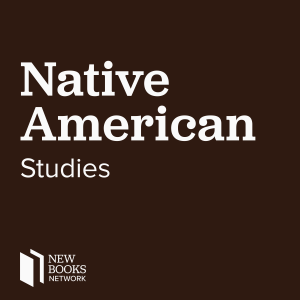
New Books in Native American Studies
Society & Culture

Alicia Puglionesi, "In Whose Ruins: Power, Possession, and the Landscapes of American Empire" (Scribner, 2022)
 2022-05-18
2022-05-18
Download
Right click and do "save link as"
The important new book by Alicia Puglionesi, In Whose Ruins: Power, Possession and the Landscapes of American Empire (Scribner, 2022), is a fat sampler of episodes that show how origin stories get made, what happens when white-supremacist origin stories are mistaken for empirical fact, and how the political impacts persist. The book is decidedly anti-capitalist; resoundingly anti-colonial. It is an invitation not to jettison story-work, but to imagine, collectively, origin stories of the present that might bring into being a more just future.
In Whose Ruins could easily be categorized as Environmental History or Native Studies. But Puglionesi forges a book that is more than either field could accomplish alone. The “power” of the book’s subtitle has a double meeting: political power and the energy sources of a capitalist economy (oil, hydropower, and nuclear energy).
The book is organized into four sections, or “sites,” that visit four evocative land features: a hulking, conical earth mound in present-day West Virginia adjacent to a decommissioned state prison; wells dug into the ground in smalltown Pennsylvania; rocks that tell stories (they’re etched with petroglyphs) along the Susquehanna River with kin fragmented elsewhere; the Sonoran Desert rich with pottery, uranium, and physicists, both white and Native. In each of these sites, people with different political projects—some announced, some implicit—have generated multiple accounts of the landscapes and ideas of value.
Within a context of shifting political power, white-settler stories about each site displaced empirical knowledge of Native labor, skill, presence, and endurance with harmful fables of white origins and of Native communities’ need for white “rescue.” Into the present day, the effect has been to justify white theft of Native land and deadly violence against tribal communities for the purposes of resource extraction. In the end, even the false white origin stories became a resource to commodify.
Puglionesi is a writer of poetry, fiction, academic scholarship, and, now, In Whose Ruins, a mass-market trade publication. She holds a PhD in History of Medicine and is a lecturer in Medicine, Science and Humanities at The Johns Hopkins University. On the page, Puglionesi has a friendly, funny, quiet presence—an affable Where’s Waldo that centers the relationships of historical actors (including spirits) and the work of scholars such as Kim TallBear, Zoe Todd, and Eve Tuck.
This conversation explores ways of living in good relation via writing; the status of truth; the relevance of singer-songwriter Prince for labor studies; and many other themes. It discusses the important book by Chadwick Allen, Earthworks Rising (Minnesota, 2022). In an unrecorded snippet, we also swap names of our favorite local indie bookstores. So check out Red Emma’s the next time you’re in Baltimore, MD (or on Bookshop.org) and Symposium, Riff Raff, and Paper Nautilus when your compass points to Providence, RI.
Laura Stark is Associate Professor at Vanderbilt University’s Center for Medicine, Health, and Society.
Learn more about your ad choices. Visit megaphone.fm/adchoices
Support our show by becoming a premium member! https://newbooksnetwork.supportingcast.fm/native-american-studies
view more
More Episodes
01234678910111213141516171819
Create your
podcast in
minutes
- Full-featured podcast site
- Unlimited storage and bandwidth
- Comprehensive podcast stats
- Distribute to Apple Podcasts, Spotify, and more
- Make money with your podcast
It is Free
- Privacy Policy
- Cookie Policy
- Terms of Use
- Consent Preferences
- Copyright © 2015-2024 Podbean.com





